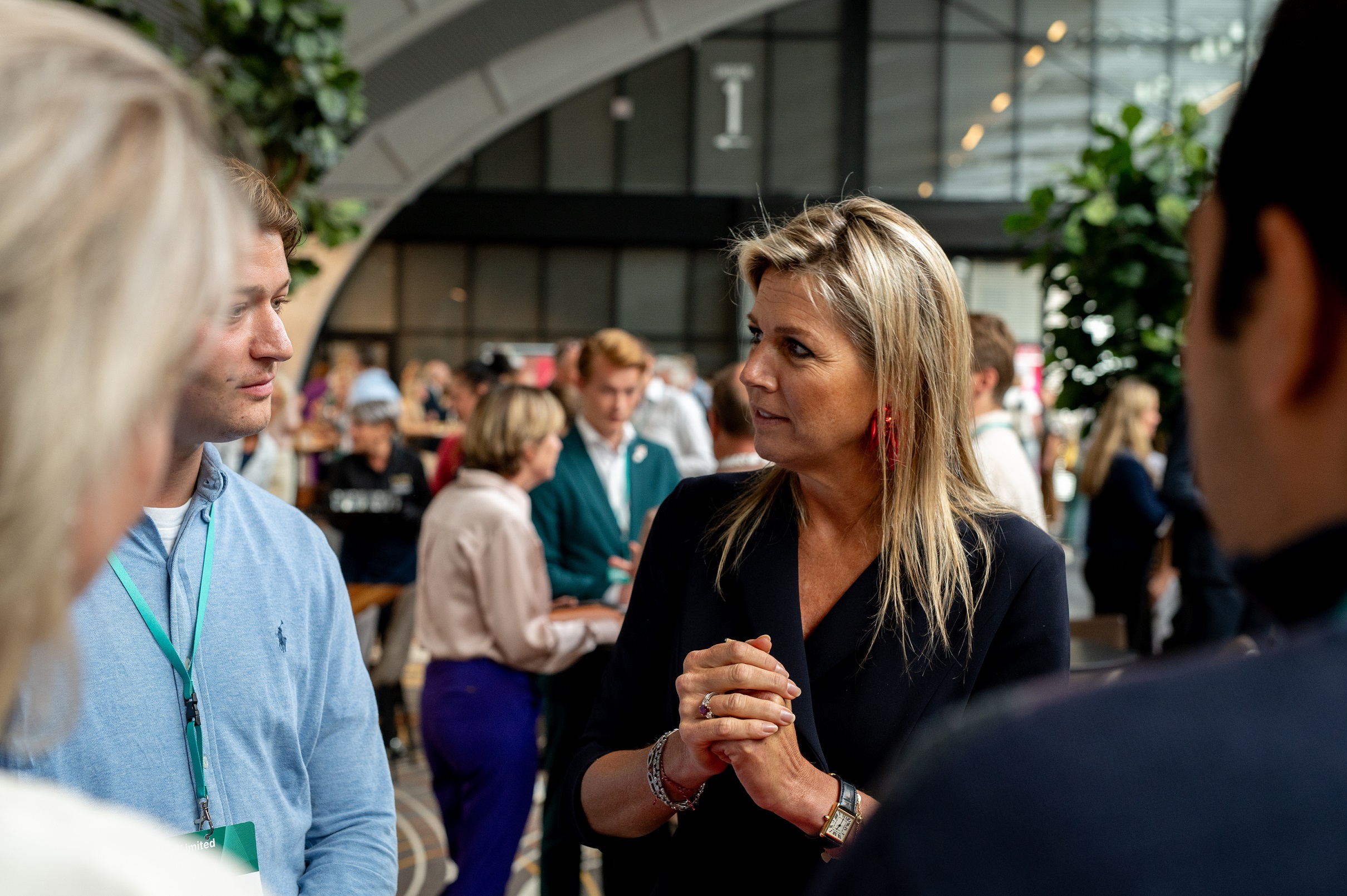Do universities pay enough attention to students’ needs and opportunities? Queen Máxima, Minister of Education Dijkgraaf and students believe there is room for improvement.
Queen Máxima spoke to students, lecturers, scientists and policymakers about student wellbeing during the UNLimited festival organised by university association UNL. (Photo: UNL/Boris Cremers)
“Your time as a student is the best time of your life, is what they say. But it can be a stressful time as well”, says Queen Máxima, addressing five hundred audience members in Den Bosch. Sometimes life isn’t what you make of it, she emphasises.
At the UNLimited festival, which was hosted by university association Universities of The Netherlands last Thursday and Friday, students, teachers, scholars and policymakers talked about the future of universities and the expectations of students.
On behalf of the MIND Us Foundation, the Queen raised awareness for mental wellbeing amongst young people and students. Her own daughter Amalia isn’t exactly having a carefree student time either, given the criminal death threats she has received, but the Queen didn’t bring this up in her contribution.
‘International students have become a bit controversial now’
Mariam Ikassrien, student at Utrecht University, is affiliated to the foundation. She came to the Netherlands from Morocco at age thirteen and didn’t speak the language. Ikassrien wanted to go to university, she tells the audience. “This meant I had to work extremely hard, because I was simply put in the lowest secondary school level. This caused a lot of stress. And I’m very grateful to my student advisor at university for offering to see me every week. Without those talks with him, my life would have turned out very differently.”
International student
The importance of student advisors, to whom Mariam owes a great deal, is also highlighted by TU Delft student Abdelkader Karbache. They are important to students with a migration background, but even more so to another group, he says. “International students have become a bit controversial now, but they in particular experience a lot of pressure.”
 Minister Dijkgraaf and Queen Máxima in conversation with students. (Photo: HOP)
Minister Dijkgraaf and Queen Máxima in conversation with students. (Photo: HOP)
It mainly concerns his fellow students from outside Europe. “They pay a fortune to be here and all they do is work on their study progress, completely isolating themselves from the rest. They don’t know anyone. And they don’t know how to get the help that’s available.”
Education Minister Dijkgraaf acknowledges the problem. “We ask a lot from international students. Institutions have to try their best to reach them as well.” In the coming period, some internationals will also have to learn a bit of Dutch while studying here.
Worrying sign
ASML executive Peter Wennink thinks this is a worrying sign. International students are exactly what the Brabant-based chip machine manufacturer needs. “I urgently need sharp minds and there’s a lot of talent abroad. Why would they need to learn Dutch when they want to study here? That will only scare them off, putting us at a disadvantage we won’t be able to make up for anymore.”
Dijkgraaf responds, jokingly: “I understand others have a less nuanced vision on this. But needs vary across universities. That’s something we can look at as well.”
Can we still talk about that, or is it too late? Won’t the new law lead to a situation where the standard is Dutch, Rector Peter Paul Verbeek of University of Amsterdam wants to know. “If you have to teach two thirds in Dutch, then…”
“Can I briefly say something on this subject?”, Dijkgraaf interjects. “Nowhere in the bill does it say that. What it does say, is that we want the language of instruction to be chosen carefully. No mention is made of the desired Dutch to English ratio. And if education is delivered in Dutch, that of course doesn’t mean it has to be Dutch throughout. In future, a Dutch-taught programme can be one third in English. People at universities are currently upholding an idea that is false!” The Minister had expected better from the “smartest people in the country”.
Study pressure
The speakers leave the stage. Dijkgraaf talks to the press. Does his bill increase the pressure on international students? It does not, he believes. “Because all that really changes is that educators have to give better arguments for why a programme needs to be in English. At the same time, we have to keep making sure we can handle student intake. That we have enough rooms. That we have enough teachers. This also benefits international students.”
‘Shouldn’t diplomas dissapear altogether?’
The attendees head off to various sub-sessions. The Queen and the Minister discuss student wellbeing with students, teachers and scholars of different universities.
Passions sometimes run high and unconventional ideas abound. A session that stands out is the one where a teacher, gesturing wildly, raises the question of whether diplomas shouldn’t disappear altogether. “That might take away a great deal of study pressure.”
HOP, Peer van Tetterode
Translation: Taalcentrum-VU
Do you have a question or comment about this article?
redactie@hogeronderwijspersbureau.nl


Comments are closed.